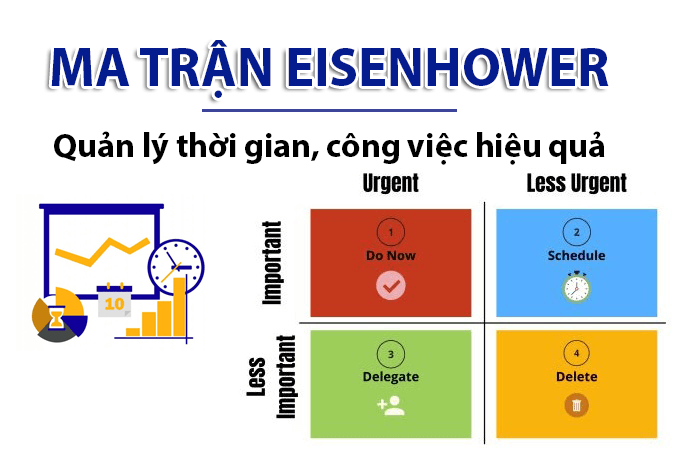
Effective time management skills of successful people
You don’t know how to manage your time effectively and scientifically, causing you to miss the deadline? Are you curious what the timetable of successful people is like? The following article will show you how to use a time management chart to have closer control over your work and life.
Effective time management skills
Define goals
Setting goals is the most effective way to manage time. When you have a clear goal, you know what you need to do to achieve that goal, and know how to plan to use your time in a more scientific and reasonable way.
Make a to-do list
List the tasks that need to be done during the day, week and month (especially making a personal schedule during the week), helping you easily manage your valuable time. You will know what you need to do at what time, what day, when it needs to be completed… Use mindmap diagrams to visualize the entire amount of work that needs to be done
“Arrange tasks” in order of priority
One of the most reasonable and smart ways to organize your time is to prioritize. After listing the tasks that need to be done, take time to check which important tasks need to be done first and which later. Please mark important tasks and do them immediately to ensure they are completed on time, then continue with the remaining tasks.
Discipline and habits
Set your own rules and follow those rules and any notices or punishments to remind yourself. When everything is in order, you will have more time, ending the situation of rushing every day to race against time but everything goes wrong.
Focus
Concentration is the way to not waste time. When doing something, focus all your energy and intelligence on the job. That not only brings high work results but also helps you save a lot of time.
Eliminate bad habits
You should make a list of bad habits to eliminate from your life, because they will destroy your goals and delay your plans. For example, before turning on the computer, write down the things you need to do on the computer to avoid surfing Facebook too much or useless websites.
Time management chart
The Eisenhower Matrix helps determine what is most important to do first and optimizes time very effectively.

(Photo source: Internet)
P1 – Important and urgent
Includes the following types:
- Unpredictable when it will happen: Caring for a sick relative, urgent meeting, work email related to an important project, conflict with a customer…
- Predict when it will happen: Wedding day, parents’ birthday, company anniversary…
- Backlogs due to laziness and procrastination: Exam review schedule, report submission, presentation content preparation…
Types 1 and 2 require immediate action, but type 3 can minimize pressure by moving them to section P 2.
P2 – Important but not urgent
P2 does not require doing it right away, but must do everything because it is important, such as cultivating reading habits, learning foreign languages, learning new skills related to work…
If you are working on P2 and P1 arises, priority should be given to completing P1 first, then P2 will be resolved (do not leave it until the next day).
P3 – Not important but urgent
The characteristic of this section is that they have nothing meaningful to accomplish your goals but they are urgent, such as someone asking you to go shopping while studying, a call from a relative you haven’t seen for a long time…
The best way is to solve it as quickly as possible, maybe ask someone else to do it, and learn how to politely refuse and end calls/texts to save time for important things.
P4 – Not important and not urgent
Spend the minimum amount of time on this item because it really doesn’t bring any significant benefits, such as surfing Facebook, reading sensational news, gossiping…
The most effective time of day to study
The most effective study time of the day is divided into 4 frames as follows:
4:30 – 6:00 a.m.: Learning theory
According to research by many experts, this is the most ideal time to memorize. Because this is the time when the mind relaxes after a long sleep, combined with a quiet space and fresh air, the brain will be most receptive to information.
7:15 a.m. – 10 a.m.: Study subjects related to society, literature, language
7:15 a.m. – 10 a.m. is the time frame to study subjects related to society, literature, language… These subjects also require memorizing a certain amount of knowledge and require less logical thinking.
14h – 16h30 : Studying natural subjects
The afternoon period is ideal for natural subjects, which require a lot of logical thinking and calculation.
19:45 – 22:30 : Study subjects that require calculation or do not require much memorization
After a long day, the brain is quite tired. At this time, we should not overstrain our brains with complex knowledge or require a lot of memorization.
At the end of the article, I hope you will improve your time management skills.



Leave a Reply